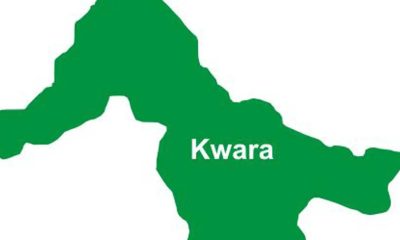Opinion
[ICYMI] Ilorin and Dan Fodio’s deadstock

[ICYMI] Ilorin and Dan Fodio’s deadstock
By Lasisi Olagunju
(Published in the Nigerian Tribune on Monday, 15 July, 2024)
Justice Ibrahim Kolapo Gambari, JCA became the Emir of Ilorin in August 1995 and decreed the ‘Kolapo’ in his name abolished. He said he should thenceforth be known and called Alhaji Ibrahim Sulu-Gambari; all former documents remain valid. He gave no reason for his decision but not a few of us thought it was his way of hiding the Yoruba content in the bloodstream of the House of Shehu Alimi, his Fulani roots. When Emir Ibrahim Sulu-Gambari took that unusual, surprising step, little did he know that the day would come when his aunt, Hajia Maryam, married to a king of Kano, and her sons would suffer discrimination and be tagged ‘Yoruba’.
It is the way of toads to detour into any available crater whenever it discovers it can no longer find its way to the stream. The chairman of the New Nigeria People’s Party (NNPP) in Kano State, Hashim Dungurawa, a few days ago addressed journalists in Kano and alleged that President Bola Tinubu was working hard to impose the deposed 15th emir of Kano, Aminu Ado Bayero, on the emirate because he shared same Yoruba background with the president. “If the President thinks he will use a few of his kinsmen in Kano and the alleged Bayero’s Yoruba lineage to continue to keep the deposed Emir Aminu Ado Bayero in the state, let him wait for 2027, we will show him that those people will not help him,” Dungurawa warned. When you heard his threats about 2027, you would think that Kano votes mattered in 2023. The votes were like rain water; they were surplus but they were wasted, unhelpful, unuseful to the person they were cast for. The same will happen in 2027.
The Kano NNPP man who spoke is not a lone wolf. He is a member of a preening pack that think themselves special and others of lesser breed. I understand what he voiced out has been in the whispering lips of the sands and boulders of Kano even before the emirship crisis unfolded. They call the deposed emir “son of the Yoruba woman.”
Around here, a child does not claim his father’s compound and disclaim his mother’s homestead. Aminu Ado Bayero is a grandson of the 8th emir of Ilorin; Aminu’s mother was a sister to the mother of the incumbent Ilorin emir. Ordinarily, this long line of Fulani ancestry should be a plus for whoever has it in the Fulani north, but in the peculiar politics of our feudal Nigeria, the Ilorin ruling family would only be recognized as ‘northern’ if they knew their limits. I hope they know now that they are fringe elements and fringe elements can never be allowed to dip their hands into the main bowl of the house.
Hashim Dungurawa, the NNPP chief who said loudly what was being said in whispers, is even said not to be a Fulani himself. He is said to be Hausa – the original owners of Kano before the Dan Fodio Jihad threw them into the sea of the barren street. Did you notice the irony here?
READ ALSO:
- BREAKING: Kano Assembly passes bill to establish second-class emirates
- Court dismisses Emefiele UK medial travel application
- Elon Musk to support Trump’s re-election with $45m a month
There is no ‘pure’ blood anywhere. It is 201 years this year that Afonja lost his ancestral throne of Ilorin to the children of Sheikh Alimi, his spiritual adviser and friend. In those two centuries, the children of Alimi, from generation to generation, have remained Fulani only by name, history and ancestry. Mohammodu Odolaye Aremu was a Dadakuada musical artiste of Ilorin ancestry. He died in 1997. He expended a great deal of his career years effusively singing the cultural and political histories of his city of birth for the careful to note and ponder on. Emir Mohammed Sulu-Gambari reigned in Ilorin from 1959 to 1992. He was the father of the present Emir Ibrahim Gambari. Odolaye waxed a record for the grand old man chanting his oríkì. He serenaded him “Alabi Òpó mo gbádùn oko mi ojo/ Súlú Oba gbogbo wa ní Ilorin…(Alabi Opo, I enjoy my lord / Sulu, our king in Ilorin). ‘Alabi’ is a personal Yoruba oríkì; the ‘Opo’ that follows it is the lineage panegyric (oríkì orílè). That lineage is Òpómúléró, the nearest English translation is ‘mainframe’. That is a lineage that feeds stubborn wine to stubborn child and proceeds to send that recalcitrant, drunk child to war. They proudly say they did it to Afonja who went to war never to come back:
Òpó tí ò gboràn, e kojú è síná
Iná tí ò gboràn, e kojú è sómi
Omi tí ò gboràn, baba wa ní á fi pon’tí
Otí tí ò gboràn, e f’ómo líle mu
Omo líle tí ò gboràn, e rán an rojú Ogun
Sebí Ogun náà l’Àfònjá lo tí ò fi padà wálé mó
Omo kèké ta dídùn, aso lèdìdì ènìyàn.
Emir Mohammed Sulu-Gambari was alive when Odolaye waxed his record and called him Alabi Opo. The emir did not ask the bard to shut up and did not say he wasn’t what he was called. He valued and enjoyed the Yoruba content of his existence so much that his children remained valued additions to the cultural assets of the land they inherited while maintaining their links to their paternal ancestors.
It is interesting that people who lost their ‘critical’ voices in the eight years of Muhammadu Buhari’s ruinous reign are now raising their chords. And, Tinubu, because he is a Yoruba man, is the whipping boy for the years of the Buhari locust. What they do with the successor to their Bayajidda II is what the Germans call “den Hund vor dem Löwen schlagen” – beat a dog before/for a lion. They think their throats should be the only expressway to heaven. Dungurawa’s snide broadside to the Yoruba was vilely divisive, provocative and unfortunate but his Kano and Ilorin victims must thank him (and his masters) for waking them up. They (the victims), at least, should be aware now that the butterfly may be winged and fly like a bird, but it is not a bird and won’t be allowed to enjoy bird privileges. It will be interesting to know how ex-emir Aminu, his brothers and sisters in Kano and their uncles in Ilorin took the statement from those they thought were their kinsmen- the authorities in Kano.
READ ALSO:
- JUST IN: Sanwo-Olu gives N100,000 each to Lagos Batch B Corps members
- Kano State Govt slams new charge on ex-Gov Ganduje
- Osun govt issues warning as scammers hack governor’s phone number
It is very interesting that for the Fulani North, because of the throne of Kano, Ilorin is no longer a Fulani town. God is great. But I commend them. It is always good to drop whatever is not yours no matter how long you’ve held on to it. Ilorin did not start as a settlement of the Fulani; the emirate there is a progeny of conquest. It is a victim of the characteristic Yoruba blind-fight for thrones. They fought and shredded their velvet, the Fulani picked it up and from it sewed an empire. The modern version of how 19th century Yoruba treated their heritage is what you see in Kano and Sokoto today. My friend in Kaduna told me that in Sokoto and Kano after the last elections, deposition of kings was the sole slogan: “Sabon Gwamna, Sabon Sarki” (new governor, new king). And they are working hard at it. That was the Yoruba misadventure that delivered Ilorin to Fulani forces in 1823/24.
There is an irony in some Kano people calling a prince or princess from Ilorin an outsider. The founder of Ilorin emirate, Sheikh Al-Salih (alias Shehu Alimi), was a Fulani who hailed from Tankara in present Niger Republic. It was from there he came to school in Bunza, present Kebbi State in today’s Nigeria. Just like him, Uthman Dan Fodio, the founder of the Sokoto caliphate, and by extension the emirate of Kano, was born in Maratta in the Tahoua region of today’s Niger Republic. An account said Alimi was a contemporary of Uthman Dan Fodio with Jibril bin Umar as their common teacher. But history did not say Alimi started out as a jihadist in the mould of Dan Fodio. He was a simple preacher and itinerant spiritualist who hawked his knowledge and power from one Yoruba town to the other. He was in Old Oyo, Iseyin, Ogbomoso and Kuwo before Afonja, a prince of Oyo, invited him to Ilorin in aid of his independence (rebellion) against his lord, the Alaafin. The rest is well recorded by history.
The more you read Ilorin’s well-documented history, the more you understand the tapestry of its ethnic configuration. There are tomes of materials available to the patient who is also curious to know. There is Ahmad b. Abi’s ‘Talifakhbar al qurun min Umara ‘ balad Ilurin’ (1912) with its critique by H. O. Danmole (1984). There is H.B. Hermon-Hodge’s ‘Gazetteer of Ilorin Province’ (1929). There is H. O. Danmole and Toyin Falola’s ‘The Documentation of Ilorin by Samuel Ojo Bada’. There is J.A. Atanda’s ‘The Fulani Jihad and the Collapse of the Old Oyo Empire’. There is also Stefan Reichmuth’s ‘Imam Umaru’s Account of the Origins of the Ilorin Emirate’ (1993); and then, Ann O’Hear’s ‘Elite Slaves in Ilorin in the 19th and 20th Centuries’ (2006). There are many more from local historians here and there.
READ ALSO:
- Kagame wins fourth term as Rwanda president with 99% votes
- JUST IN: Another Reps member, Ekene Adams, dies
- BREAKING: NECO releases 2024 examination results for Unity schools
Ilorin has the enviable luck of being a melting pot for all races, “tribes and tongues”. You find there people who would proudly say their ancestors were Fulani or Hausa or Kanuri or Dendi, Nupe, Baruba, Wangara, even Arabs. Yet, they are all ‘Yoruba’ today and they are proud to speak the language. You want to ask why the conqueror speaks the language of the conquered? It is because the Yoruba gene is very resistant to assimilation; the conquerors only got the throne, the soul refused to stay in their pouch. The Yoruba culture does what dams do to their surrounding environment. Their backwaters fester and consume their catchment areas. It is arguably the only African culture that survived slavery outside Africa. Go to Brazil, to Cuba and Trinidad and Tobago, Saint Lucia, Guyana, Haiti, Jamaica, about 200 years after slavery, descendants of Yoruba slaves there proudly raise the banner of their fathers. That is the case with the essential Yoruba-Ilorin.
While politicians in Kano are busy making identity nooses to hang their opponents, their street is dead drunk with tears of hunger and want. But the people rarely matter in matters like this. They won’t ever revolt; re-vote of their tormentors is what they will do. So, I have no dog in the bitter contest for the throne of Kano. The same should be our reaction to the machete attacks on the traditional powers and privileges of the Sultan of Sokoto by the state governor. At best, I watch events in those places the way I watched Sunday’s epic final of Euro 2024 football match between England and Spain. The Game of Thrones in the Fulani north, from Kano to Sokoto, is therefore, to me, entertainment. We run commentaries such as this only because, as the Yoruba say, it is always good to show the goopy snail that its eyes are caked with mucus.
Krishna Udayasankar, Singapore-based Indian writer and author of ‘3’ – a novel on the founding of Singapore, believes that “no empire lasts forever, no dynasty continues unbroken” How is the Kano kingship crisis going to end for the ruling class in northern Nigeria? When you combine what is happening in that city with the simmering volcano in Sokoto, would you be wrong if you say the signs portend sundown for the elaborate empire built by Dan Fodio in the first decade of the 19th century? No intervention can save that empire from itself. Maybe that elaborate realm has to die for Nigeria to live and thrive.
While the battle for thrones rages on, the Dan Fodio clan got a whole ministry from Tinubu last week. The president called it the Ministry of Livestock Development. I heard their elites’ happy footfalls. Who told the Fulbe that their problem would be over with a special ministry for their cows? Something tells me they know too that they are only interested in the billions that will be pumped into that loss centre. My dictionary says the opposite of livestock is deadstock. Something tells me that is the fruit from that luxuriant tree unless they change their ways. But they won’t change. For them, it is already past midnight.
[ICYMI] Ilorin and Dan Fodio’s deadstock
Opinion
El Rufai’s Arise News mind game with Ribadu, By Farooq Kperogi

El Rufai’s Arise News mind game with Ribadu, By Farooq Kperogi
El Rufai’s Arise News mind game with Ribadu, By Farooq Kperogi
Opinion
Oshiomhole: Behold the 13th disciple of Christ

Oshiomhole: Behold the 13th disciple of Christ
Opinion
AFCON 2025: Flipping Content Creation From Coverage to Strategy

AFCON 2025: Flipping Content Creation From Coverage to Strategy
By Toluwalope Shodunke
The beautiful and enchanting butterfly called the Africa Cup of Nations (AFCON) emerged from its chrysalis in Khartoum, Sudan, under the presidency of Abdelaziz Abdallah Salem, an Egyptian, with three countries—Egypt, Sudan, and Ethiopia—participating, and Egypt emerging as the eventual winner.
The reason for this limited participation is not far-fetched. At the time, only nine African countries were independent. The remaining 45 countries that now make up CAF’s 54 member nations were either pushing Queen Elizabeth’s dogsled made unique with the Union Jack, making supplications at the Eiffel Tower, or knocking at the doors of the Palácio de Belém, the Quirinal Palace, and the Royal Palace of Brussels—seeking the mercies of their colonial masters who, without regard for cultures, sub-cultures, or primordial affinities, divided Africa among the colonial gods.
From then until now, CAF has had seven presidents, including Patrice Motsepe, who was elected as the seventh president in 2021. With more countries gaining independence and under various CAF leaderships, AFCON has undergone several reforms—transforming from a “backyard event” involving only three nations into competitions featuring 8, 16, and now 24 teams. It has evolved into a global spectacle consumed by millions worldwide.
Looking back, I can trace my personal connection to AFCON to table soccer, which I played alone on concrete in our balcony at Olafimihan Street—between Mushin and Ilasamaja—adjacent to Alafia Oluwa Primary School, close to Alfa Nda and Akanro Street, all in Lagos State.
Zygmunt Bauman, the Polish-British sociologist who developed the concept of “liquid modernity,” argues that the world is in constant flux rather than static, among other themes in his revelatory works.
For the benefit of Millennials (Generation Y) and Generation Z—who are accustomed to high-tech pads, iPhones, AI technologies, and chat boxes—table soccer is a replica of football played with bottle corks (often from carbonated drinks or beer) as players, cassette hubs as the ball, and “Bic” biro covers for engagement. The game can be played by two people, each controlling eleven players.
I, however, enjoyed playing alone in a secluded area, running my own commentary like the great Ernest Okonkwo, Yinka Craig, and Fabio Lanipekun, who are all late. At the time, I knew next to nothing about the Africa Cup of Nations. Yet, I named my cork players after Nigerian legends such as Segun Odegbami, Godwin Odiye, Aloysius Atuegbu, Tunji Banjo, Muda Lawal, Felix Owolabi, and Adokiye Amiesimaka, among others, as I must have taken to heart their names from commentary and utterances of my uncles resulting from sporadic and wild celebrations of Nigeria winning the Cup of Nations on home soil for the first time.
While my connection to AFCON remained somewhat ephemeral until Libya 1982, my AFCON anecdotes became deeply rooted in Abidjan 1984, where Cameroon defeated Nigeria 3–1. The name Théophile Abéga was etched into my youthful memory.
Even as I write this, I remember the silence that enveloped our compound after the final whistle.
It felt similar to how Ukrainians experienced the Battle of Mariupol against Russia—where resolute resistance eventually succumbed to overwhelming force.
The Indomitable Lions were better and superior in every aspect. The lion not only caged the Eagles, they cooked pepper soup with the Green Eagles.
In Maroc ’88, I again tasted defeat with the Green Eagles (now Super Eagles), coached by the German Manfred Höner. Players like Henry Nwosu, Stephen Keshi, Sunday Eboigbe, Bright Omolara, Rashidi Yekini, Austin Eguavoen, Peter Rufai, Folorunsho Okenla, Ademola Adeshina, Yisa Sofoluwe, and others featured prominently. A beautiful goal by Henry Nwosu—then a diminutive ACB Lagos player—was controversially disallowed.
This sparked outrage among Nigerians, many of whom believed the referee acted under the influence of Issa Hayatou, the Cameroonian who served as CAF president from 1988 to 2017.
This stroll down memory lane illustrates that controversy and allegations of biased officiating have long been part of AFCON’s history.
The 2025 Africa Cup of Nations in Morocco, held from December 21, 2025, to January 18, 2026, will be discussed for a long time by football historians, raconteurs, and aficionados—for both positive and negative reasons.
These include Morocco’s world-class facilities, the ravenous hunger of ball boys and players (superstars included) for the towels of opposing goalkeepers—popularly dubbed TowelGate—allegations of biased officiating, strained relations among Arab African nations (Egypt, Algeria, Tunisia, and Morocco), CAF President Patrice Motsepe’s curt “keep quiet” response to veteran journalist Osasu Obayiuwana regarding the proposed four-year AFCON cycle post-2028, and the “Oga Patapata” incident, where Senegalese players walked off the pitch after a legitimate goal was chalked off and a penalty awarded against them by DR Congo referee Jean-Jacques Ndala.
While these narratives dominated global discourse, another critical issue—less prominent but equally important—emerged within Nigeria’s media and content-creation landscape.
Following Nigeria’s qualification from the group stage, the Super Eagles were scheduled to face Mozambique in the Round of 16. Between January 1 and January 3, Coach Eric Chelle instituted closed-door training sessions, denying journalists and content creators access, with media interaction limited to pre-match press conferences.
According to Chelle, the knockout stage demanded “maximum concentration,” and privacy was necessary to protect players from distractions.
This decision sparked mixed reactions on social media.
Twitter user @QualityQuadry wrote:
“What Eric Chelle is doing to journalists is bad.
Journalists were subjected to a media parley under cold weather in an open field for the first time in Super Eagles history.
Journalists were beaten by rain because Chelle doesn’t want journalists around the camp.
Locking down training sessions for three days is unprofessional.
I wish him well against Mozambique.”
Another user, @PoojaMedia, stated:
“Again, Eric Chelle has closed the Super Eagles’ training today.
That means journalists in Morocco won’t have access to the team for three straight days ahead of the Round of 16.
This is serious and sad for journalists who spent millions to get content around the team.
We move.”
Conversely, @sportsdokitor wrote:
“I’m not Eric Chelle’s biggest supporter, but on this issue, I support him 110%.
There’s a time to speak and a time to train.
Let the boys focus on why they’re in Morocco—they’re not here for your content creation.”
From these three tweets, one can see accessibility being clothed in beautiful garments. Two of the tweets suggest that there is only one way to get to the zenith of Mount Kilimanjaro, when indeed there are many routes—if we think within the box, not outside the box as we’ve not exhausted the content inside the box.
In the past, when the economy was buoyant, media organisations sponsored reporters to cover the World Cup, Olympics, Commonwealth Games, and other international competitions.
Today, with financial pressures mounting, many journalists and content creators seek collaborations and sponsorships from corporations and tech startups to cover sporting events, who in turn get awareness, brand visibility, and other intangibles.
As Gary Vaynerchuk famously said, “Every company is a media company.” Yet most creators covering AFCON 2025 followed the same playbook.
At AFCON 2025, most Nigerian journalists and content creators pitched similar offerings: on-the-ground coverage, press conferences, team updates, behind-the-scenes footage, analysis, cuisine, fan interactions, and Moroccan cultural experiences.
If they were not interviewing Victor Osimhen, they were showcasing the stand-up comedy talents of Samuel Chukwueze and other forms of entertainment.
What was missing was differentiation. No clear Unique Selling Proposition (USP). The result was generic, repetitive content with little strategic distinction. Everyone appeared to be deploying the same “Jab, Jab, Jab, Hook” formula—throwing multiple jabs of access-driven content in the hope that one hook would land.
The lesson is simple: when everyone is jabbing the same way, the hook becomes predictable and loses its power.
As J. P. Clark wrote in the poem “The Casualties”, “We are all casualties,” casualties of sameness—content without differentiation. The audience consumes shallow content, sponsors lose return on investment, and creators return home bearing the “weight of paper” from disappointed benefactors.
On November 23, 1963, a shining light was dimmed in America when President John F. Kennedy was assassinated.
As with AFCON today, media organisations sent their best hands to cover the funeral, as the who’s who of the planet—and if possible, the stratosphere—would attend. Unconfirmed reports suggested that over 220 VVIPs were expected.
While every newspaper, radio, and television station covered the spectacle and grandeur of the event, one man, Jimmy Breslin, swam against the tide. He chose instead to interview Clifton Pollard, the foreman of gravediggers at Arlington National Cemetery—the man who dug John F. Kennedy’s grave.
This act of upended thinking differentiated Jimmy Breslin from the odds and sods, and he went on to win the Pulitzer Prize in 1986.
Until journalists and content creators stop following the motley and begin swimming against the tide, access will continue to be treated as king—when in reality, differentiation, aided by strategy, is king.
When every journalist and content creator is using Gary Vaynerchuk’s “Jab, Jab, Jab, Hook” template while covering major sporting events, thinkers among them must learn to replace one jab with a counterpunch—and a bit of head movement—to stay ahead of the herd.
Toluwalope Shodunke can be reached via tolushodunke@yahoo.com
-

 metro2 days ago
metro2 days agoIKEDC Sets Feb 20 Deadline for Customers to Submit Valid IDs or Face Disconnection
-

 Education2 days ago
Education2 days agoSupreme Court Affirms Muslim Students’ Right to Worship at Rivers State University
-

 metro2 days ago
metro2 days agoLagos Police Launch Manhunt for Suspect in Brutal Ajah Murder
-

 News2 days ago
News2 days agoAso Rock Goes Solar as Tinubu Orders National Grid Disconnection
-

 Business3 days ago
Business3 days agoNaira Could Trade Below ₦1,000/$ With Dangote Refinery at Full Capacity — Otedola
-

 metro2 days ago
metro2 days agoArmy University Professor Dies in Boko Haram Captivity After Nearly One Year
-

 International2 days ago
International2 days agoTrump Halts Minnesota Immigration Crackdown After Fatal Shootings, Protests
-

 Politics3 days ago
Politics3 days agoCity Boy Movement Receives Bus Donations from Zenco, Obi Cubana for Tinubu’s Campaign















